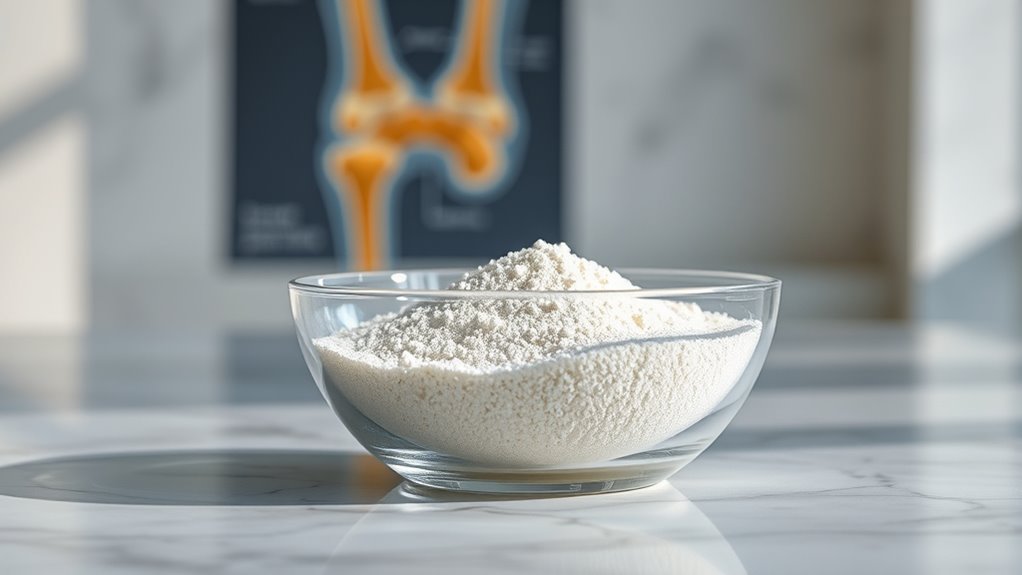Collagen can support joint health by potentially reducing osteoarthritis pain and aiding cartilage repair, but evidence varies and isn’t conclusive for everyone. Some studies show benefits from collagen supplements, especially types I and II, while others find little effect, especially for rheumatoid arthritis. Safety is generally good, but results depend on factors like collagen type and dosage. To uncover more about what works and what doesn’t, explore this topic further.
Key Takeaways
- Collagen supplements may reduce joint pain and improve function, but evidence varies depending on type and dosage.
- Type II collagen, especially native forms like UC-II, shows promising results for osteoarthritis but less so for rheumatoid arthritis.
- Collagen supports cartilage repair by stimulating chondrocyte activity and enhancing cartilage matrix production.
- While generally safe, collagen supplements can cause minor side effects and should be sourced from reputable brands.
- More high-quality, long-term studies are needed to confirm optimal use, effectiveness, and mechanisms of collagen in joint health.
Understanding the Different Types of Collagen and Their Roles in Joints

Understanding the different types of collagen is essential for appreciating how they support joint health. Type II collagen makes up about 90% of the collagen in articular cartilage, providing essential structure and elasticity that help your joints withstand mechanical stress. Types IX and XI also contribute to cartilage integrity, working alongside type II to maintain healthy joint tissue. Minor collagens like types III, IV, V, VI, and others play supportive roles, regulating and reinforcing cartilage stability. While type I collagen is absent in healthy cartilage, it appears in damaged tissue, indicating repair or fibrosis. Type X collagen, involved in cartilage and bone, acts as a biomarker for cartilage remodeling and degeneration. Additionally, understanding the collagen network reveals how these proteins work together to maintain joint resilience and function. The intricate interplay among these collagen types ensures joint durability and helps prevent degeneration over time. Together, these collagen types form a complex network that keeps your joints functional and resilient.
Evidence Supporting Collagen’s Benefits for Osteoarthritis and Joint Pain

Numerous studies have demonstrated that collagen supplements can effectively alleviate symptoms of osteoarthritis, including joint pain and stiffness. Meta-analyses show that collagen improves joint health and reduces discomfort. It may work by stimulating your body’s production of joint collagen, supporting cartilage repair, and easing pain. Clinical trials across different collagen types, such as native type II and hydrolyzed collagen, report benefits like decreased pain and increased mobility. Some forms, like UC-II, have shown promising results compared to traditional treatments like glucosamine. While side effects are rare, minor issues such as headaches and gastrointestinal discomfort can occur. Effectiveness varies among individuals, with some experiencing significant relief and others seeing minimal changes depending on initial symptom severity. Additionally, the process of collagen absorption can influence how well these supplements work. Overall, the evidence suggests collagen can be a valuable tool in managing osteoarthritis.
The Limited Impact of Collagen on Rheumatoid Arthritis

Although collagen has anti-inflammatory properties in theory, current evidence does not support its effectiveness in treating rheumatoid arthritis (RA). Clinical studies have failed to show significant improvements in pain, inflammation, or joint function attributable to collagen. Most trials are limited in size or inconclusive, making it hard to draw firm conclusions. Collagen’s immune effects in RA are complex, sometimes worsening inflammation or inducing tolerance, which adds to the uncertainty. A notable trial tested four doses of oral type II collagen over 24 weeks; only the lowest dose showed a slight benefit, and higher doses didn’t improve outcomes. When compared to standard treatments like methotrexate, collagen was less effective. Overall, the evidence suggests collagen shouldn’t replace or be relied upon as a primary therapy for RA.
How Collagen Supplements May Support Cartilage Repair and Reduce Inflammation

Collagen supplements may support cartilage repair by stimulating chondrocytes to produce key components of the cartilage matrix, such as proteoglycans and type II collagen. When you take collagen hydrolysates, they are absorbed into your bloodstream and quickly reach your cartilage tissues. Specific peptides like Pro-Hyp and Pro-Hyp-Gly promote the synthesis of these essential molecules, encouraging repair of damaged cartilage. Collagen peptides also stimulate chondrogenic proliferation and differentiation, improving cartilage health. Animal studies show promising results, supporting their potential role in cartilage regeneration. While clinical trials have mixed outcomes, some research suggests benefits for joint stiffness. Although the evidence for reducing inflammation is limited, collagen’s biochemical effects may indirectly support joint health by maintaining cartilage integrity and possibly influencing inflammatory pathways. Additionally, emerging research highlights the importance of biochemical mechanisms in understanding how collagen influences joint function. Moreover, the presence of bioactive peptides can modulate cellular signaling pathways involved in tissue repair, further supporting joint health. Recognizing the role of natural compounds in tissue regeneration can also enhance strategies for joint health maintenance. Furthermore, understanding the mindfulness techniques that aid in stress reduction can contribute to overall joint health by decreasing muscle tension and promoting relaxation. Furthermore, nutritional strategies that include collagen-rich foods or supplements may optimize joint support and overall mobility.
Safety Profile and Considerations for Collagen Use

Collagen supplements are generally considered safe when taken within recommended doses, but it’s important to be aware of potential side effects and individual considerations. Most people tolerate doses up to 10 grams daily for up to six months without significant issues. Minor side effects like mild gastrointestinal discomfort, such as heaviness or diarrhea, are rare. Allergic reactions can occur, especially if you’re sensitive to fish or shellfish sources. Pregnant or breastfeeding women should avoid collagen due to limited safety data. Those with food allergies, gout, or protein metabolism disorders should consult a healthcare provider before use. While collagen has a favorable safety profile, choose reputable brands with third-party testing to ensure purity and quality. Additionally, dog names can be a fun way to personalize your pet’s health journey. It is also advisable to stay informed about scientific skepticism regarding certain health claims to make well-informed decisions. Being aware of evidence-based research can help you assess the true benefits and limitations of collagen supplements. For example, understanding the biological role of collagen can provide insights into its potential effectiveness. Furthermore, understanding the limitations of current studies can help set realistic expectations about what collagen can achieve. Always seek professional advice if combining supplements with medications or other treatments.
Navigating Current Recommendations and Identifying Research Gaps

Current recommendations for collagen use in joint health focus primarily on specific types and formulations, but they can be confusing due to varying study results and product differences. Generally, type II collagen is suggested for joint pain and osteoarthritis, while types I and III target skin health. Hydrolyzed collagen is popular because it’s easily absorbed and may support cartilage repair, but doses and durations vary across studies. Many supplements combine collagen with other ingredients like glucosamine, complicating the assessment of its true effects. The evidence shows some benefits, but results are inconsistent, especially for conditions like rheumatoid arthritis. Critical gaps remain, including understanding long-term impacts, ideal dosing, and how different collagen types influence joint health. More large, well-designed research is essential to clarify collagen’s true potential.
Frequently Asked Questions
Can Collagen Supplements Fully Reverse Joint Damage or Just Alleviate Symptoms?
You might wonder if collagen supplements can fully reverse joint damage or just ease symptoms. Current evidence suggests they mainly provide symptom relief, like reducing pain and stiffness, especially in mild cases. While collagen supports cartilage health and might slow damage progression, it doesn’t usually regenerate severely damaged joint tissues. Your response to collagen varies, and long-term benefits depend on individual factors and the extent of joint damage.
Are There Specific Collagen Types More Effective for Joint Health?
You might wonder if some collagen types work better for joint health. The truth is, Type II collagen is the most targeted and effective, especially for knee osteoarthritis, since it’s a key component of cartilage. Hydrolyzed collagen also helps because its peptides reach joint tissues. While other types can support overall health, focusing on Type II may give you the best chance to improve joint function and reduce pain.
How Long Does It Typically Take to See Benefits From Collagen Supplements?
You’re probably wondering how long it takes to notice benefits from collagen supplements. Typically, you’ll start seeing improvements in joint health and mobility within three to six months of consistent daily use. Remember, sticking to the recommended 10 grams daily is key, and combining it with healthy habits like exercise can boost results. Everyone responds differently, so patience is essential for experiencing the full benefits.
Are Collagen Supplements Safe for Long-Term Use in Older Adults?
You might think long-term collagen use poses risks, but evidence suggests it’s generally safe for older adults. Oral supplements have a solid safety profile, rarely causing side effects or contaminants when quality products are selected. While long-term studies are limited, current data supports continued use, especially when combined with healthy lifestyle choices. Just remember to consult your healthcare provider to confirm it’s suitable for your specific health needs.
Can Collagen Help Improve Joint Health in Athletes With No Existing Joint Disease?
You’re wondering if collagen can boost joint health for athletes without existing joint issues. Research shows collagen supplementation may improve joint stability, reduce pain, and support cartilage health, even in those without pre-existing conditions. By promoting connective tissue repair and reducing inflammation, collagen can help maintain your joint function and potentially lower injury risk. Incorporating collagen into your routine might help you stay active and perform at your best.
Conclusion
While collagen shows promise for supporting joint comfort, it’s wise to view it as a gentle companion rather than a miracle cure. Stay informed and consult with your healthcare provider to weave collagen into a balanced approach. Remember, the journey to better joint health is often a quiet, steady process—like a soft breeze that gradually guides you forward. Embrace the potential, but keep expectations comfortably in check as you explore your options.









